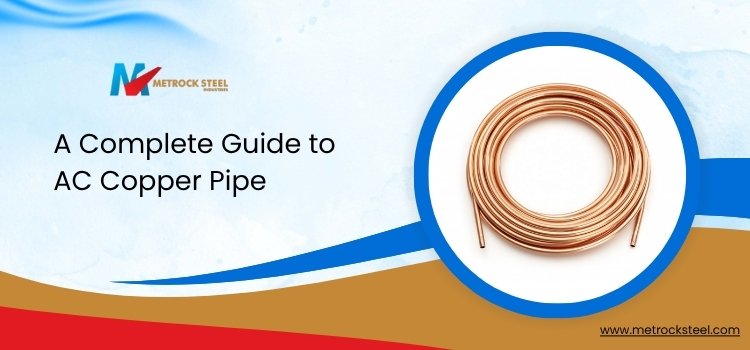A Complete Guide to AC Copper Pipe for Cooling Systems
When it comes to air conditioning systems, uninterrupted cooling occurs only with the use of copper. Considering the toughness, durability, and heat transmission capabilities, such copper pipes are used for heating, ventilation, and air conditioning systems in both domestic and commercial settings. This write-up serves as a Complete Guide to AC copper pipe, covering everything you need to know about types, sizes, installation methods, and key advantages.
Why AC Copper Pipe is Essential
The refrigerant moves in or out between the indoor and outdoor AC units via AC copper pipes. Without the correct copper pipe for your AC system, you may experience poor cooling, leaks, or higher energy costs.
A few reasons copper qualifies as a choice metal are:
- Excellent thermal conductivity
- Durable
- Corrosion resistant
- Simple to bend and install
- Performing excellently under high pressure
Types of Copper Pipes Used in AC Systems
1. Soft Copper Pipes
- Bending is flexible and easy to do.
- Used in tight quarters in residential AC unit installations.
- Commonly sold alongside split AC installations.
2. Hard Copper Pipes
- Durable and rigid.
- Ideal for large HVAC systems and commercial projects
- Must use fittings for turns and connections
AC Copper Pipe Sizes
Selecting the appropriate copper pipe size in AC means maintaining the correct flow of the refrigerant. The size depends on the cooling capacity of the air conditioner (tonnage).
Typical sizes for copper pipes to be used for AC are:
- 1/4″ for the liquid line
- 3/8″ for the suction line for smaller units
- 1/2 inch and higher for bigger systems regarding tonnage
Installation Tips for AC Copper Pipe
Proper installation of AC copper pipes ensures infinite service.
- Insulation: Always insulate the line to maintain the temperature.
- Jointing: Brazed joints must be used to ensure a leak-free joint.
- Bending: Do not bend sharply so that there is no hard obstruction to the smooth flow of refrigerant.
- Leak Testing: Keep this test going before the final operation.
Benefits of Using Copper Pipe for Air Conditioning
- High heat transfer efficiency – cooling is faster
- Strength and durability – withstands much pressure and temperature settings
- Maintenance-free – corrosion-resistant and long life
- Energy-efficient – puts less strain on compressors and saves electricity
Conclusion:
The AC copper pipe forms the backbone of any air conditioning system. From selecting appropriate types and sizes of pipes to ensuring proper installation practices, every single detail is of paramount importance for efficient cooling and long-term durability.
FAQ: AC Copper Pipe
Q1: Which copper pipe is best for AC installation?
For household ACs, mostly the soft copper pipes are recommended, while in the case of big commercial systems, the hard copper is preferred.
Q2: Is aluminum workable instead of copper pipe for any AC?
Copper is preferred because it accomplishes heat transfer better and is more durable than aluminum.
Q3: How long does an AC copper pipe last?
The copper pipe for an AC will actually last more than 20 years with insulation and maintenance.
Need reliable AC copper pipe solutions? Ensure efficiency and long-lasting performance. Email us at sales@metrocksteel.com or contact us today.

